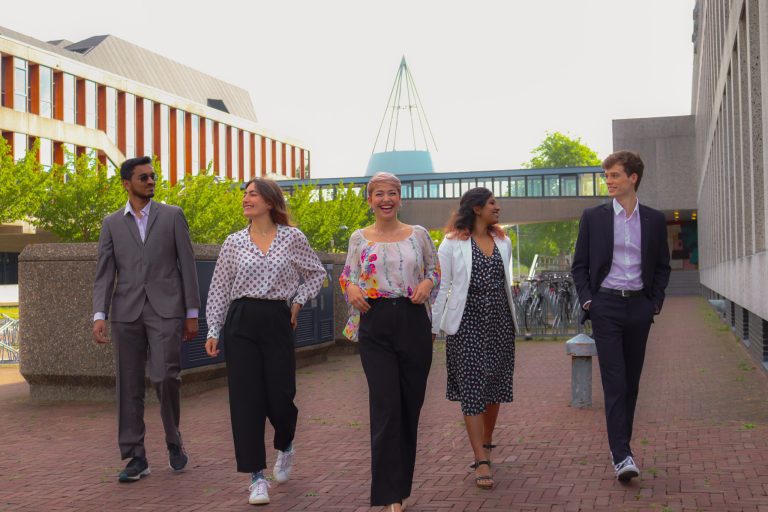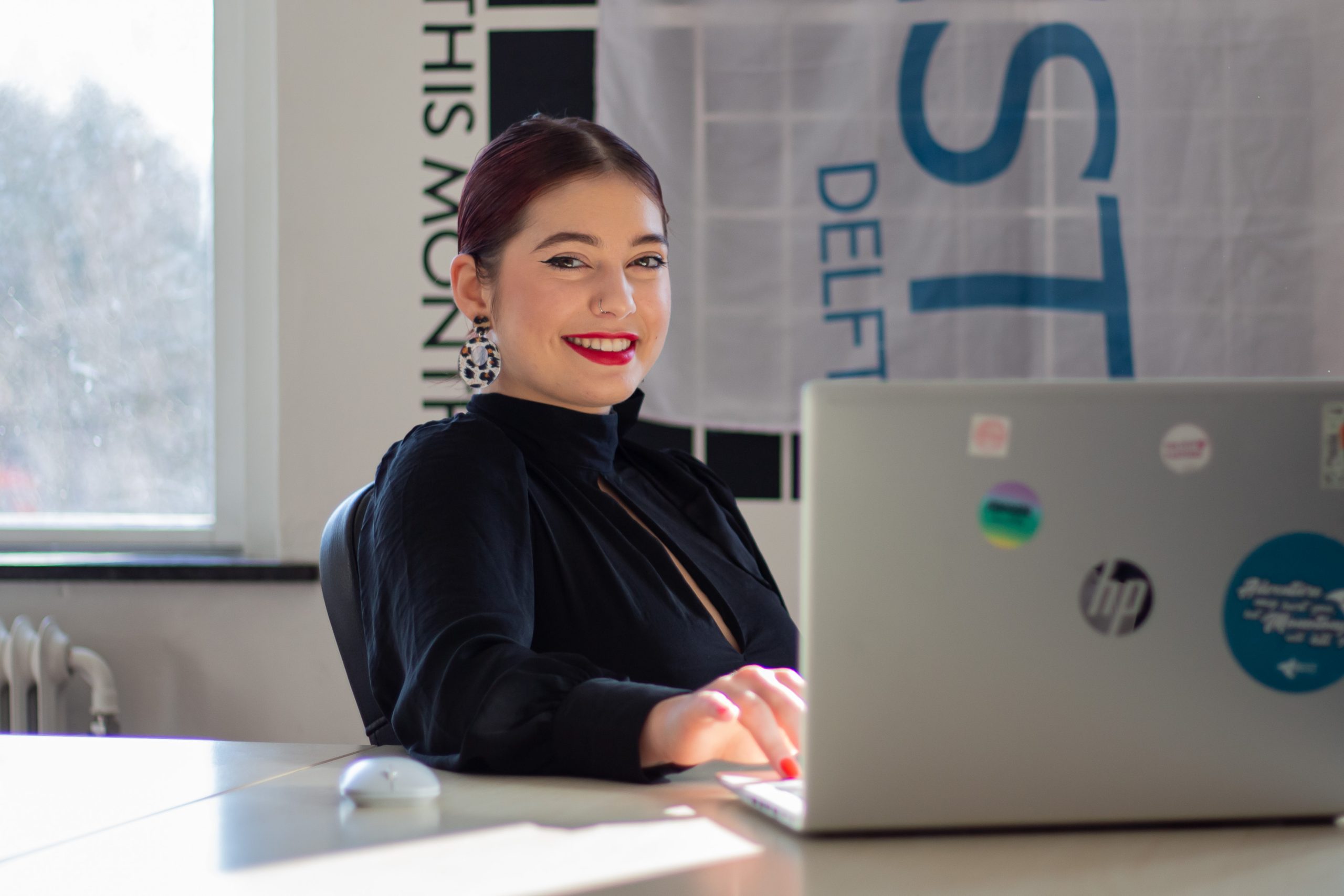TU Delft could create a happier international community by improving its international presence during the introduction period, says BEST Delft President Ada Precup.
President of BEST Delft Ada Precup: “I think TU Delft could offer us more support.” (Photo: Justyna Botor)
Although the national survey on diversity and inclusion in higher education was prematurely terminated, several TU Delft students were eager to continue talking about the topic. In a short portrait series, they share their experiences and recommendations. Today Ada Precup, bachelor student in Nanobiology and President of the BEST Delft international student association.
“Especially since Covid, BEST Delft has had the reputation of providing a ‘family away from home’. That’s not without reason. We welcome all students: Dutch, European and non-European. To make everyone feel welcome, we communicate solely in English and we don’t have a hazing period. I think that means a lot, especially for international bachelor students who are not familiar with the Dutch student culture. We currently have 25 members of 15 different nationalities and we celebrate every one of them. We create an inclusive environment in our events and observe all our members’ holidays. During our international evenings which we host three or four times a year, all our members get together and share food, music and traditional stories about their country.”
‘We talk, but action is very difficult to take’
“We have established a well-functioning mentoring system so that we can successfully blend so many different people and cultures. You get allocated a ‘family’ at BEST, which consists of two ‘parents’ who are more experienced members. The moment you join you are welcomed into the family that is chosen based on your interests and study programme. It’s a great foundation, especially for incoming students who have to adapt to both living abroad and to TU Delft’s teaching methods. Over the years we’ve learned that getting used to the intensity of classes and the way professors work can be quite challenging for incoming international students. To help them cope, we offer a support system that is otherwise very difficult to find at TU Delft itself.”
“I understand that we are a huge university with gigantic hoops to jump through to make changes. However, I do feel TU Delft could outsource this to the people who are already doing it and know what they are doing. So many associations are trying to focus on international students, but we barely get asked to help. TU Delft holds diversity and inclusion meetings which we are invited to and where we talk about our issues. However, while we talk, no one is able to do anything. Action is very, very difficult to take.”
‘TU Delft could offer us more support’
“I think TU Delft could offer us more support. We still don’t have an office on campus, and we may even lose our current place, even though we provide great services for all TU Delft students such as affordable exchange opportunities – which are so valuable to opening one’s mind and heart – engineering competitions and study support for international students. In regard to financial support, TU Delft gives us a yearly grant for our events, although each board has to apply for it and we always run the risk of being denied it. Our Board is voluntary and receives no compensation for their work because we don’t fit the criteria set by TU Delft. Our members pay no membership fee because everyone contributes their time to our vision. BEST’s volunteering opportunities give our members the chance to grow, and help them develop their soft skills. So we are dependent on corporate relationships to be sustainable.”
“One way TU Delft could help broaden their own and the students’ horizons is by giving us a presence at the introduction events. We are quite involved with the Introduction Programme (IP, introduction week for master, exchange and transition students). But the OWee is a different story. Dutch is the main language spoken and little attention is given to new international students. Since it’s hard for international bachelor students to get to know the different international associations, we have tried to persuade the OWee committee to give us a platform too, at the information market or somewhere else in the programme. But last August we didn’t get a stand at the information market and weren’t invited to the associations’ parade. I think it has to do with tradition. The OWee was a huge event even before TU Delft was open to internationals, but times have changed and OWee must adapt and change too. Also the board is not diverse and this leads to a lack of perspective that hurts the OWee’s efforts.”
‘There is a lack of perspective which is hurting the OWee’s efforts’
“Currently, four of TU Delft’s bachelor programmes are fully in English. Every year a new bunch of international students arrives and on top of that TU Delft wants to grow. If you don’t change the OWee to also serve international students, you will have a considerable problem. There are many international associations that have extensive experience in welcoming new students, they only need to give us a platform during the OWee. It wouldn’t be much of hassle for the organisers, but it would make a huge difference for bachelor students.”
“Our biggest focus is trying to bridge the gap between Dutch and international students. I know that a lot of internationals look for some sort of connection. This is especially true for master students since they often want to stay and work here after their studies. Trying to build a community as an international is hard while studying here, but it becomes even harder when you start working here. This is why we are striving for some sort of collaboration between international and Dutch students. I think it’s also important for Dutch students to be aware that TU Delft gives them a unique opportunity to get to know so many different cultures. It’s important to reach out and peak outside your bubble. We would love to help all students expand their horizons. Hopefully we can start doing so at the next OWee.”
 The BEST Delft board 2022-2023.
The BEST Delft board 2022-2023.BEST Delft is the local branch of BEST International, a network in Europe of over 80 local groups. Its mission is to empower diversity through students development. At TU Delft it focuses on three main areas of development: career support, complementary education (such as soft skills training), and educational involvement. It works with TU Delft to help develop the educational system.
Written comment by Alex Lokhorst, Liaison Community Relations, on behalf of the OWee organisation:
‘We regret that BEST perceived the communication with the OWee Board as being […]. However, some points mentioned need to be nuanced. For several years now, the language of communication for OWee participants has been in both Dutch and English. Think of social media, website, signage, BINAS and programme. In addition, all programme elements (such as the talk show and association forum) are translated or offered in English (such as the Central Opening and Student Talk).
The OWee actively pays attention to engaging and approaching international bachelor students. Last year, for example, we organised the Digital International Pre-OWee (DIPO) for the first time, focusing on informing international students and ensuring that these students are in Delft during the OWee so that they have a better chance of integrating with Dutch students and each other.
Since 2018, we have been working closely with the Introduction Programme (IP). An example of an event we jointly organise with the IP is the activity market at X. This market offers the participants of both OWee and IP, a diverse range of sports, cultural and International associations. Last year, BEST was also part of this.
The organisation of the OWee is aware that international associations (just as the Dutch ones) should be given a platform. For this reason, there is good contact with InterDelft (the umbrella organisation for international associations in Delft), international associations have been given room to pitch themselves during the DIPO and participation in the Activities Market and the Parade is always an open possibility. The aforementioned points will be included in the newly formed policy.’
This article was partly made possible by a contribution from the Journalism Promotion Fund.
Also read our other articles on the topic of diversity and inclusion:
- Figureheads of diversity policy need to be thick-skinned
- How hot topic issues dominate the debate on diversity and inclusion
- Diversity and inclusion in facts and figures.
- How can TU Delft also be a place for neurodivergent students?
- Why diversity policy goals and effects need to be clearer
- How can TU Delft also be a place for neurodivergent students?
- ‘As a woman, I have to really do my best to have my voice heard’
Do you have a question or comment about this article?
m.vanderveldt@tudelft.nl


Comments are closed.